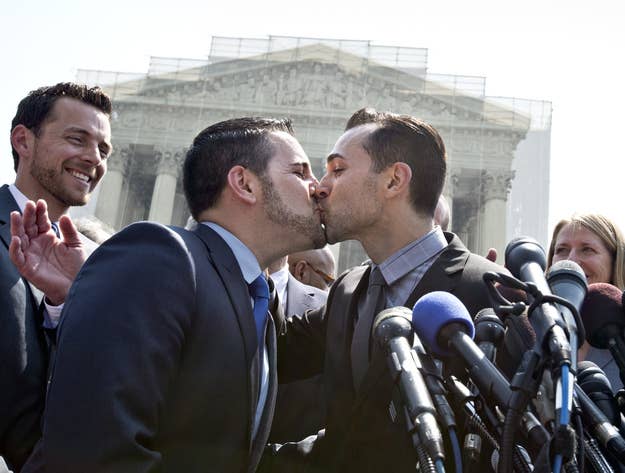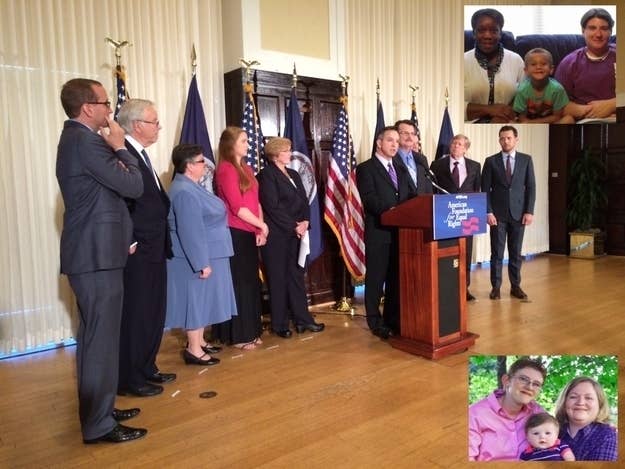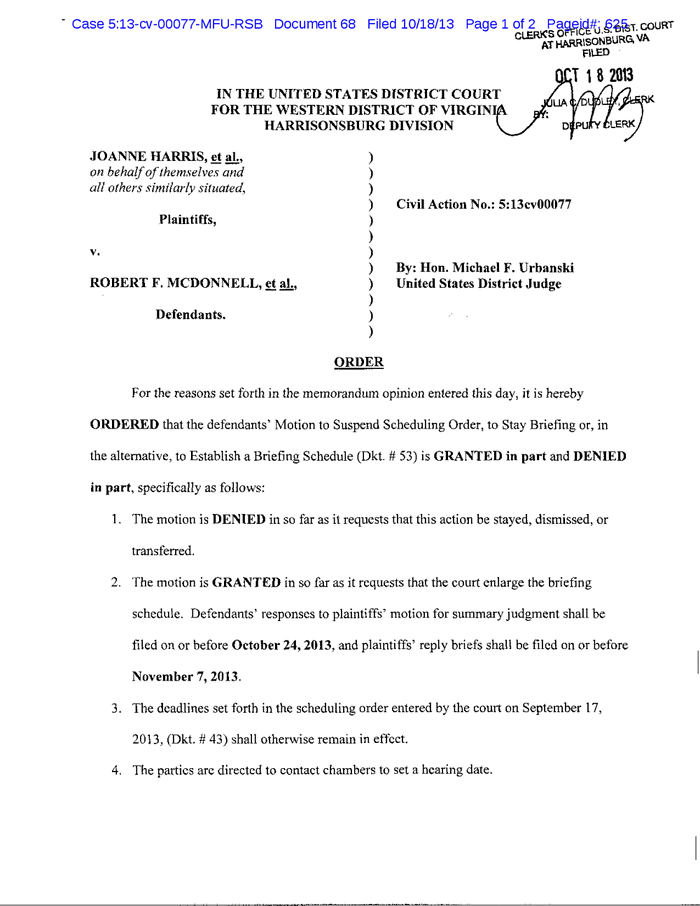
WASHINGTON — There is a fight over marriage equality brewing in Virginia — not between supporters and opponents, although that's there, too, but among groups backing lawsuits to bring marriage equality to the Commonwealth.
As LGBT legal advocates are backing challenges to marriage laws across the country, dueling cases in Virginia show that the effort to argue the case that brings marriage equality to all 50 states is being hard fought.
On one side, a case filed by Lambda Legal and the American Civil Liberties Union initially had garnered significant attention, but lawyers Ted Olson and David Boies — and the American Foundation for Equal Rights, which financed the legal fight against California's Proposition 8 — already were working behind the scenes to join up and serve as lawyers on a case filed earlier by a local law firm in Virginia Beach, a partnership they have since announced.
Bringing — and winning — the Supreme Court case that allows same-sex couples to marry across the nation is a victory that each of the legal organizations covet, and it is an argument that each of the high-caliber lawyers backing marriage equality wants to make his or her legacy. It's also a boon for the law firms: Olson's firm of Gibson, Dunn & Crutcher and Boies' firm of Boies, Schiller & Flexner certainly have not been opposed to the national plaudits that their firms have gotten for their marriage work.
Although lawyers and spokespeople at all of the organizations and firms continue to press that they are all working toward the same goal, legal filings and strategies over the past two month in the two Virginia marriage cases show that they're also fighting to push their case to the front of the line.
A couple weeks after the Supreme Court's June rulings that struck down the federal ban on recognizing same-sex couples' marriage and led to the end of Proposition 8, Lambda Legal and the ACLU announced on July 9 that they would be filing a lawsuit challenging Virginia's 2006 marriage amendment.
A little more than a week later, on July 18, a small law firm with no particular background in LGBT advocacy in Virginia Beach filed a lawsuit in the Eastern District of Virginia on behalf of Timothy Bostic and Tony London, a couple wanting to marry in the state. They were seeking a court ruling that Virginia's ban on marriage equality violated the equal protection and due process clauses of the U.S. Constitution.
That filing was quickly followed on Aug. 1 by Lambda Legal and the ACLU filing their lawsuit on the other side of the state, in the Western Division of Virginia, on behalf of Joanne Harris and Jessica Duff and Christy Berghoff and Victoria Kidd, two couples, and seeking to have the case certified as a class action on behalf of all same-sex couples seeking to marry in Virginia and same-sex couples seeking to have marriages performed elsewhere recognized in Virginia.
On Sep. 3, the Bostic lawsuit was amended to include a second couple, Carol Schall and Mary Townley, a couple who were legally married in California and wish to have Virginia recognize their marriage. Then, on Sep. 30, Olson and Boies announced that they, and AFER, would be joining forces with the Virginia law firm — Shuttleworth, Ruloff, Swain, Haddad & Morecock — to press the two couples' lawsuit.
Since then, Virginia officials have sought to put the Lambda Legal and ACLU lawsuit on hold because the "first-filed" Bostic case could resolve the legal issues raised in both cases. The Harris case lawyers — which include Paul Smith, a partner at Jenner & Block and the lawyer who successfully argued the Lawrence v. Texas case at the Supreme Court that ended sodomy laws in 2003 — opposed that motion. They also argued against a question posed by Judge Michael Urbanski, per a court entry regarding an October 8 hearing in the case, "as to why this case should not be transferred to Norfolk [where the Bostic case is being heard] and consolidate[d] for judicial economy."
Urbanski has yet to rule on either the motion for a stay or on a motion by the state defendants, prompted by the judge's question, to transfer and consolidate the Harris case with the Bostic case.

Asked why the Harris case's legal team opposed the transfer and consolidation, Smith told BuzzFeed, "We said we were happy with where our case is now, although the judge certainly has some discretion to move it. We noted that there is nothing unusual or irregular about having two courts in two districts in the same circuit address the same legal issue in different cases."
Regarding the state's argument for a stay of the Harris case while the Bostic case proceeds, Smith added, "And we pointed out that the 'first-filed' rule doesn't apply to a class action like ours and we are in any event the first-filed case with regard to the question of recognition of out-of-state marriages.
"All that said, if it's transferred we will work with the other plaintiffs to make sure the claims are prosecuted as well as possible in whatever forum."
A lawyer for the Shuttleworth firm, for his part, when contacted for comment by BuzzFeed forwarded the request to AFER, whose spokeswoman told BuzzFeed in an email, "[W]e are handling all communications/media requests for the Bostic legal team."
"AFER had actually been looking at Virginia more than two years ago as a possible state in which to file our next lawsuit," AFER spokeswoman Elizabeth Riel told BuzzFeed. "Following the [Proposition 8] decision we began a Plaintiff search in [Virginia], and at the same time we began reaching out to other teams litigating federal marriage cases nationwide that didn't have organizational sponsors. When the [Bostic] case was filed, we reached out to the Shuttleworth team and began discussing ways we could assist in their efforts. They then invited us to join their case. The AFER Board talked it over with our legal team and accepted the invitation of the Shuttleworth team to join the Bostic case in September."
Notably, the decision to amend the complaint to include an out-of-state marriage-recognition claim likely came, per Riel's timeline, after the AFER team began discussing the possibility of joining lawsuit with the Shuttleworth firm. It was a strategic move, as suggested by Smith's comment, aimed at ensuring that the Bostic case contains all of the same legal claims as will be argued in the Harris case. Asked if AFER's legal team was involved in the decision to amend the complaint, Riel told BuzzFeed, "[W]e can't comment on our discussions with co-counsel."
The tensions among the groups is not new, although the changed landscape of support for marriage equality on several fronts has led to the current situation of everyone pressing for differing marriage lawsuits, whereas the initial dispute was over whether to file a federal lawsuit at all.
Ever since the people who would end up forming AFER began in 2008 to discuss a federal marriage lawsuit — something other LGBT legal groups had avoided in recent times — tensions between AFER, which formed to file the lawsuit against California's Proposition 8 marriage amendment in May 2009, and the more established organizations have simmered mostly below the surface.
The tensions have been laid bare on only a few occasions, most notably when Lambda Legal, the ACLU and the National Center for Lesbian Rights attempted to intervene in the AFER challenge to California's Proposition 8.
In a scathing letter sent to the three groups, AFER board president Chad Griffin wrote in July 2009 to ask that the groups not seek to intervene in the case. "You have unrelentingly and unequivocally acted to undermine this case even before it was filed. In light of this, it is inconceivable that you would zealously and effectively litigate this case if you were successful in intervening," he wrote. One of the lawyers AFER supporters consulted before forming the organization to file the lawsuit, according to Griffin: Paul Smith.
"Your strident criticism of our suit has been constant," Griffin — now president of the Human Rights Campaign — continued, citing several examples and concluding that the groups' "public and private campaign" aimed to "undermine our efforts to vindicate the federal constitutional rights of California's gay and lesbian residents."
During that time, the final major LGBT legal organization, Gay & Lesbian Advocates & Defenders, was pressing forward with its own strategy — a challenge to Section 3 of the Defense of Marriage Act. As GLAD's case proceeded, other DOMA challenges were filed, and the ACLU and Paul Weiss law firm-backed case brought by Edith Windsor ended up being heard by the Supreme Court.
At the same time, the justices heard AFER's challenge to Proposition 8, with Olson and Boies pressing their case for a 50-state answer from the court that would strike down all bans on same-sex couples' marriages but ending up with a Supreme Court decision that led to an end of California's ban but did not address any other bans.
In the nearly four months since that decision, cases pressing for marriage equality have been filed all over the country in multiple states and it's clear that sooner rather than later the Supreme Court will be presented with the option of considering the issue once again.
In Virginia, some of the top lawyers in the nation appear to believe that the state — and the Fourth Circuit Court of Appeals that would hear the appeal of the trial-court decision — is one of the best paths back to the high court. And they're fighting to ensure that their case is the one that does the job.
Update at 4:25 p.m. Friday:
Judge Michael Urbanksi denied the state's request to stay or transfer the Lambda Legal and ACLU Harris case in a Friday order, ordering instead that the state must respond to the plaintiffs' motion for summary judgment by October 24 and that the plaintiffs must reply to that response by November 7. Read the order:

